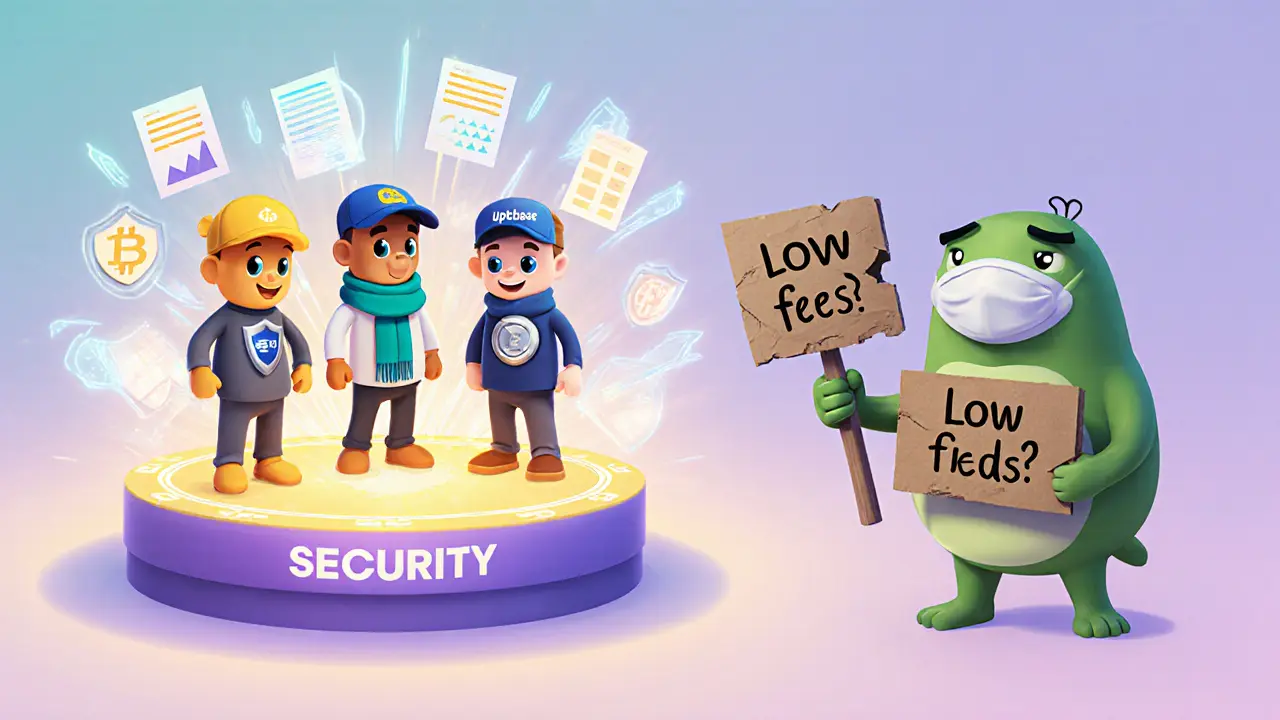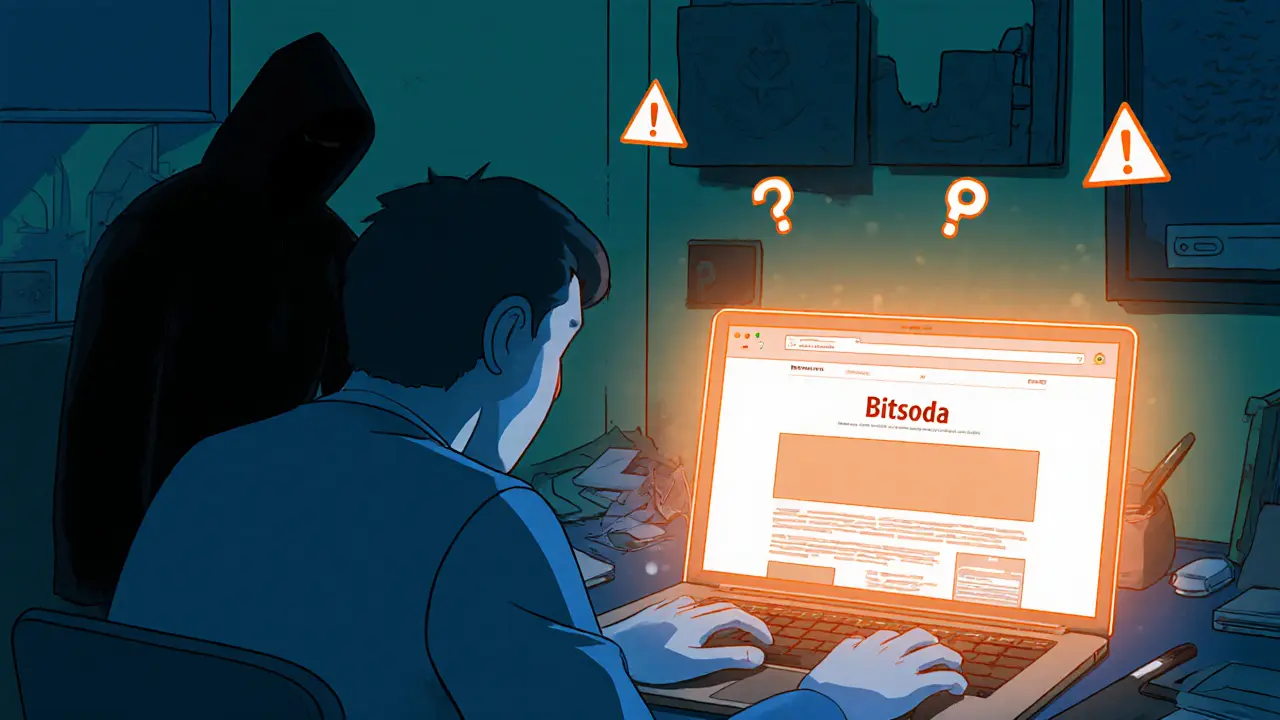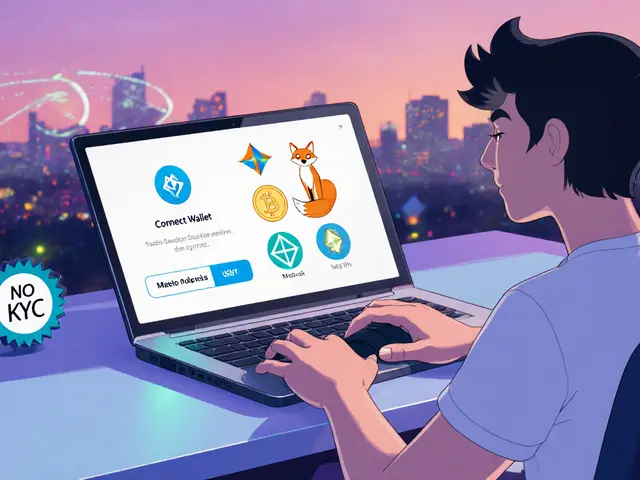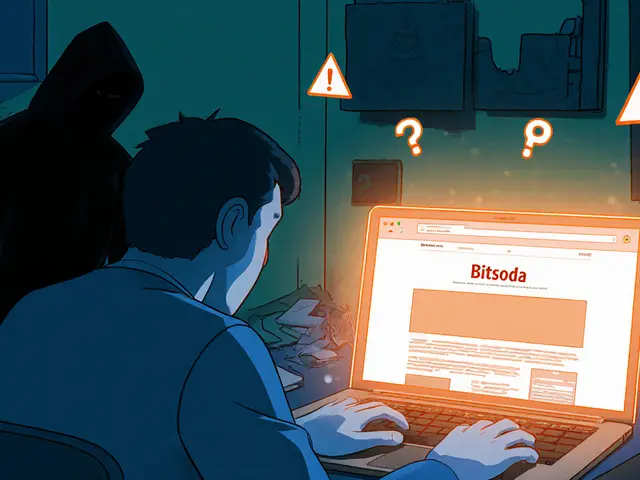Crypto Exchange Safety Checker
Verify a Crypto Exchange
Check if a crypto platform meets basic safety standards. Based on guidelines from regulatory bodies like the FCA, DFPI, and FINTRAC.
Enter details about the exchange to check its safety.
Key Takeaways
- Bitsoda shows no registration, certifications, or transparent fee schedule - classic red flags of a fake exchange.
- Regulators in California, the UK, and Canada have warned about platforms that mimic legitimate names; Bitsoda matches those patterns.
- Legitimate exchanges (Coinbase, Uphold, Gemini) publish security audits, AML policies, and clear fee tables - Bitsoda does none of this.
- If you’ve already sent money to Bitsoda, stop all communications and report the activity to your local consumer‑protection agency.
- Use the safety checklist below before trusting any new crypto service.
When you stumble across a new crypto platform, the first question is simple: Bitsoda a real exchange or just another scam? Below we break down the evidence, compare it with reputable services, and give you a step‑by‑step safety guide.
Bitsoda is a name that appears on several promotional Telegram channels and a bare‑bones website promising high returns on cryptocurrency trades. Unlike established firms, there is no public record of registration, no security certifications, and no verifiable corporate address. The lack of basic transparency already puts it in the same danger zone as hundreds of fraud‑laden platforms documented by regulators.
How to Verify a Crypto Exchange
Before you deposit any fiat or crypto, run through these three basic checks:
- Regulatory registration - look for a license number from a recognized authority (e.g., the FCA in the UK, the DFPI in California, or FINTRAC in Canada). Legit exchanges list this information on a dedicated “Compliance” page.
- Security certifications - reputable platforms publish SOC2, ISO27001, or PCI‑DSS audit reports. You can usually find the report download link or a summary on their security page.
- Public fee structure - clear, upfront percentages for maker/taker fees, withdrawal fees, and any hidden charges. If a site only offers vague “low fees” without numbers, treat it as a warning sign.
Applying these tests to Bitsoda instantly fails on all three fronts: no registration number, no audit reports, and no fee schedule.

Red Flags Specific to Bitsoda
Regulators keep detailed lists of warning signs. The California Department of Financial Protection and Innovation (DFPI) repeatedly flags platforms that use a “bit” prefix with a made‑up suffix to mimic reputable services. Bitsoda follows that exact pattern.
California Department of Financial Protection and Innovation (DFPI) reported a spike in complaints about sites like biticrypto.com that demand "fines" in crypto after promising unreal returns. The modus operandi matches the scripts observed on Bitsoda’s social channels - a charismatic figure promises education, then asks for large crypto deposits to “unlock” profits.
The UK’s Financial Conduct Authority (FCA) maintains a public register of authorized crypto‑asset firms. A quick search shows no entry for Bitsoda, while legitimate firms such as Uphold and Gemini are clearly listed.
Other red flags include:
- Pressure tactics - “Invest now or miss out” messages sent via WhatsApp or Discord.
- Unrealistic promises - guaranteed 200% returns within weeks.
- Requests for payment only in crypto wallets, often to a single address.
These patterns line up perfectly with the Massachusetts Attorney General’s warning list for fake exchanges.
Bitsoda vs. Legitimate Exchanges
| Feature | Bitsoda | Coinbase | Uphold | Gemini |
|---|---|---|---|---|
| Regulatory registration | None | US FinCEN, state licenses | FCA, FCA‑registered entity | US NFA, FCA |
| Security certifications | No public audits | SOC2, ISO27001 | SOC2, ISO27001, PCI‑DSS | SOC2, ISO27001 |
| Fee transparency | Unclear, “low fees” claim | 0.03%‑3.49% depending on method | 0.5%‑2% tiered | 0.25%‑0.5% maker/taker |
| Withdrawal limits | Arbitrary “fines” after withdrawal request | Unlimited for verified accounts | Daily limits set by payment method | Verified accounts up to $100k/day |
| Customer support | WhatsApp only, no ticket system | 24/7 chat, email, phone | Live chat, email | Phone, chat, email |
Even a quick glance at the table makes it clear: Bitsoda lacks the core attributes that any regulated exchange must provide.
Regulatory Landscape - Why It Matters
Different jurisdictions have taken strong stances against fraudulent crypto services. In Canada, the Financial Consumer Agency of Canada (FCAC) warns that crypto assets are not legal tender and that unregistered platforms are illegal. Financial Consumer Agency of Canada requires every crypto business to be registered with FINTRAC - a step Bitsoda has never taken.
Meanwhile, the UK’s FCA has suspended more than 20 unregistered crypto firms in 2024 alone, citing lack of AML controls. Financial Conduct Authority maintains a public “warning list” that includes many platforms with naming tricks identical to Bitsoda.
On the U.S. side, TRM Labs’ 2025 Crypto Crime Report flags “bit‑” prefixes as a high‑risk indicator. Their data shows that sanctioned exchanges saw an 82% drop in inflows after designations, highlighting how quickly regulators can cripple illicit operations - but only after victims have already lost money.
All of this means that if a platform is not listed on any regulator’s register, you’re likely looking at a high‑risk, possibly illegal operation.
Safety Checklist Before You Trade
- Confirm registration - search the regulator’s website for the exact company name.
- Verify security - look for published audit reports (SOC2, ISO27001).
- Read the fee schedule - if the site hides fees, walk away.
- Check withdrawal rules - reputable platforms allow you to withdraw at any time without extra “penalties.”
- Research the team - real companies list founders, office locations, and contact details.
- Search for complaints - use the DFPI Crypto Scam Tracker, Reddit’s r/CryptoScams, or the FCA warning list.
- Start small - if you decide to test a new service, use a tiny amount you can afford to lose.
Following this list will protect you from most of the traps that Bitsoda and similar scams set.
What to Do If You’ve Already Sent Money to Bitsoda
First, stop all further communication. Scammers often pressure you to send more funds once they sense you’re panicking.
- Contact your wallet provider - see if you can freeze the transaction (possible only for custodial wallets).
- File a report with the DFPI Crypto Scam Tracker - they track emerging scams and can alert other victims.
- Report to your local law enforcement and, if in the U.S., the FBI’s Internet Crime Complaint Center (IC3).
- If you’re in the UK, notify the Action Fraud portal; in Canada, reach out to the Canadian Anti‑Fraud Centre.
Document every message, screenshot the website, and keep the wallet address used by the scammer. While recovery is rare, a detailed report helps authorities shut down the operation faster.
Frequently Asked Questions
Is Bitsoda a real crypto exchange?
No. Bitsoda does not appear on any regulator’s register, lacks security audits, and has never published a fee schedule - all hallmarks of a fake platform.
How can I spot a fake exchange?
Check for licensing, audit reports, clear fees, and a transparent team. Any platform missing two or more of these is a red flag.
What regulators should I trust?
In the U.S., look for DFPI or FinCEN registration; in the UK, check the FCA register; in Canada, verify FINTRAC registration. These bodies maintain up‑to‑date lists of authorized crypto firms.
Can I get my money back after a scam?
Recovery is difficult, especially for non‑custodial wallets. Reporting the fraud improves the chance of a broader takedown, but you should treat any funds sent as lost.
Are there any legitimate alternatives to Bitsoda?
Yes. Trusted platforms like Coinbase, Uphold, Gemini, and Bitso offer regulated services, clear fees, and audited security.




Comments
When you’re looking at a new crypto platform like Bitsoda, the first thing to do is verify its regulatory status. Go to the official website of the FCA, DFPI, or FINTRAC and search for the exact company name. If you cant find a registration number, that’s a red flag. Next, examine whether the exchange publishes any security audits, such as SOC2 or ISO27001. A legitimate service will have a dedicated security page with downloadable reports. Also, check the fee schedule; a reputable exchange will list maker and taker fees clearly. Beware of sites that only promise “low fees” without numbers – that often hides hidden costs. Look at the team page; real companies list founders, office locations, and contact details. If the contact info is just a WhatsApp number, you should be sceptical. Test the withdrawal process with a tiny amount you can afford to lose; genuine platforms allow instant withdrawals without extra penalties. Keep an eye on the language used – lots of hype, promises of guaranteed returns, and pressure tactics are signs of a scam. Cross‑reference the exchange name with warning lists published by the DFPI, FCA, and local consumer protection agencies. If a platform shows up on any of those lists, steer clear. Document all your findings, take screenshots, and share them with the community so others can stay safe. Finally, if you’ve already sent funds, report the incident to the appropriate authorities and cease all communication with the scammers. By following these steps you can protect yourself from becoming another victim of a fake exchange.
Quick tip: the “Contact Us” page on a legit exchange will usually have a support ticket system, not just a single messenger link. If you only see a Telegram or WhatsApp handle, that’s a warning sign.
Just a heads‑up, the lack of any audit report for Bitsoda is pretty telling – they’re basically operating in the shadows.
Yo this Bitsoda thing is straight up circus vibes the promises are wild the jargon is heavy the hype machine is on full blast feels like a meme token pump and dump scheme
Let me be crystal clear: any platform that hides its registration and security details is operating outside the law. Regulators exist for a reason, and when they’re ignored, users pay the price. Zones like California, the UK, and Canada have issued explicit warnings about entities that mimic legitimate brands – Bitsoda fits that pattern perfectly. The absence of a transparent fee structure is another classic hallmark of fraud; you can’t trust a system that doesn’t disclose how it makes money. Moreover, the demand for crypto‑only payments to a single address is a hallmark of exit scams. In short, the risk outweighs any potential reward.
I would advise anyone considering Bitsoda to consult the official regulator registers before proceeding.
From an analytical perspective, the absence of ISO‑27001 certification indicates a lack of standardized security controls. This gap can lead to vulnerabilities in data handling and transaction integrity, making the platform unsuitable for serious investors.
Looks shady.
Let’s keep the community safe by sharing any verification steps you take, even if it’s just a quick screenshot of the regulator’s site showing no listing for Bitsoda.
It’s ethically irresponsible to give any sort of endorsement to an unregistered exchange – you’re essentially encouraging illegal activity.
In my humble opinion, the philosophical takeaway here is that transparency is the cornerstone of trust; without it, any purported “exchange” becomes mere illusion. A platform that refuses to disclose its legal standing is effectively hiding behind a veil of uncertainty.
Building on that, we as a community can foster a culture of due diligence – encouraging each other to verify, report suspicious activity, and educate newcomers. Together, we raise the bar for safety.
Isn't it odd how many scams copy the look of legit sites? 🤔 Keeping an eye out for subtle differences can save you from a lot of trouble.
One must consider the aesthetic and linguistic presentation of an exchange; a superficial veneer cannot substitute for substantive regulatory compliance.
From a national security standpoint, platforms that evade oversight pose a risk to our financial sovereignty.
Hey folks, if you’ve already fallen for Bitsoda, even though it hurts, it’s not the end – you can still report it and help prevent others from getting scammed.
The ethical implications of supporting unverified platforms are profound and worth reflecting upon.
Listen up: if you’re considering putting any money into Bitsoda, stop now and run the three‑point checklist we all know – registration, audits, fees. Dropping cash without this due diligence is tantamount to handing over your livelihood to a stranger. Even the most seasoned traders get burned when they skip these steps. The lack of any official documentation means you have no recourse if the funds disappear. Remember, the crypto world is rife with bad actors who thrive on anonymity; a reputable exchange will never hide behind vague promises. So, before you hit that “deposit” button, verify everything, or better yet, stick with platforms that have a proven track record. Your future self will thank you for not falling for the classic bait‑and‑switch.
Honestly, if you’re not 100% sure, just avoid it – no need to risk your hard‑earned cash.